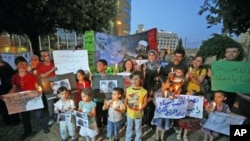As demonstrations erupted Friday across Syria, child deaths are being marked after the United Nations agency UNICEF said at least 30 children have been shot dead in anti-government protests since they first started. A rallying point is Hamza al-Khatib, a 13-year-old boy who was killed in April, and who the opposition says was tortured.
The country’s opposition movement marked Friday as “Children’s Friday” - a tribute to the dozens of young people who have died since demonstrations began in March.
The focus, said Neil Sammonds of the human rights group Amnesty International, is one death, that of 13-year-old Hamza al-Khatib, who died under mysterious circumstances.
“So he is one of 30 or more children who have died in the protests so far, all of them believed to have been shot by the security forces," said Sammonds. "But in his case, most tragically and horrifically, he appears to have been tortured to death."
Hamza al-Khatib disappeared during an April protest, where the government says he was shot and killed. The opposition says marks on his body, however, which was returned to his family in May, show the boy was tortured.
Unverified videos that appear to show his body have been posted on the website YouTube and the images have stoked fury in Syria.
Speaking Thursday, U.S. Secretary of State Hillary Clinton also voiced her regret.
“The tragedy of the young boy, Hamza Ali al-Khatib, symbolizes for many people around the world the total collapse of any effort by the Assad government to work with their own people,” said the secretary of state.
The government denies that Khatib was tortured and says it will investigate his death.
Nonetheless, Sammonds said his image could become a rallying point for Syria’s opposition.
“If we compare that with Tunisia, people have talked a lot about the case of Mohamed Bouazizi, the Tunisian street vendor of vegetables," said Sammonds. "After he set himself alight, the Tunisian protests went almost like wild fire, very quickly through the country, including to the capital, Tunis, in just a matter of weeks. That hasn’t happened yet, but perhaps through this very sad case of Hamza, we may see a move towards some kind of tipping point for change in Syria.”
The government of al-Assad made concessions this week, freeing hundreds of prisoners in an amnesty, and setting up a committee for national dialogue.
But the country’s exiled opposition, meeting this week in Turkey, said Assad should step down immediately. They vowed Thursday to work to bring down his government.
Their effort may be boosted by the symbolic power of Khatib’s death, but it’s not likely to be enough to bring down the government, said David Hartwell, at the IHS Jane’s analysis group in London.
"If Khatib’s death was going to spark off a national uprising, if you like, it probably would have done so by now," said Hartwell. "I think what remains the key is the sentiment on the street in Damascus particularly, and the ability of the regime to keep the sources of protest and the sources of discontent separate from each other. If it can do that it should be able to crack down fairly successfully."
With more deaths reported Friday in Syria, it’s yet unclear how severe that crackdown will be.




